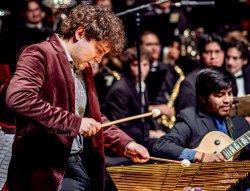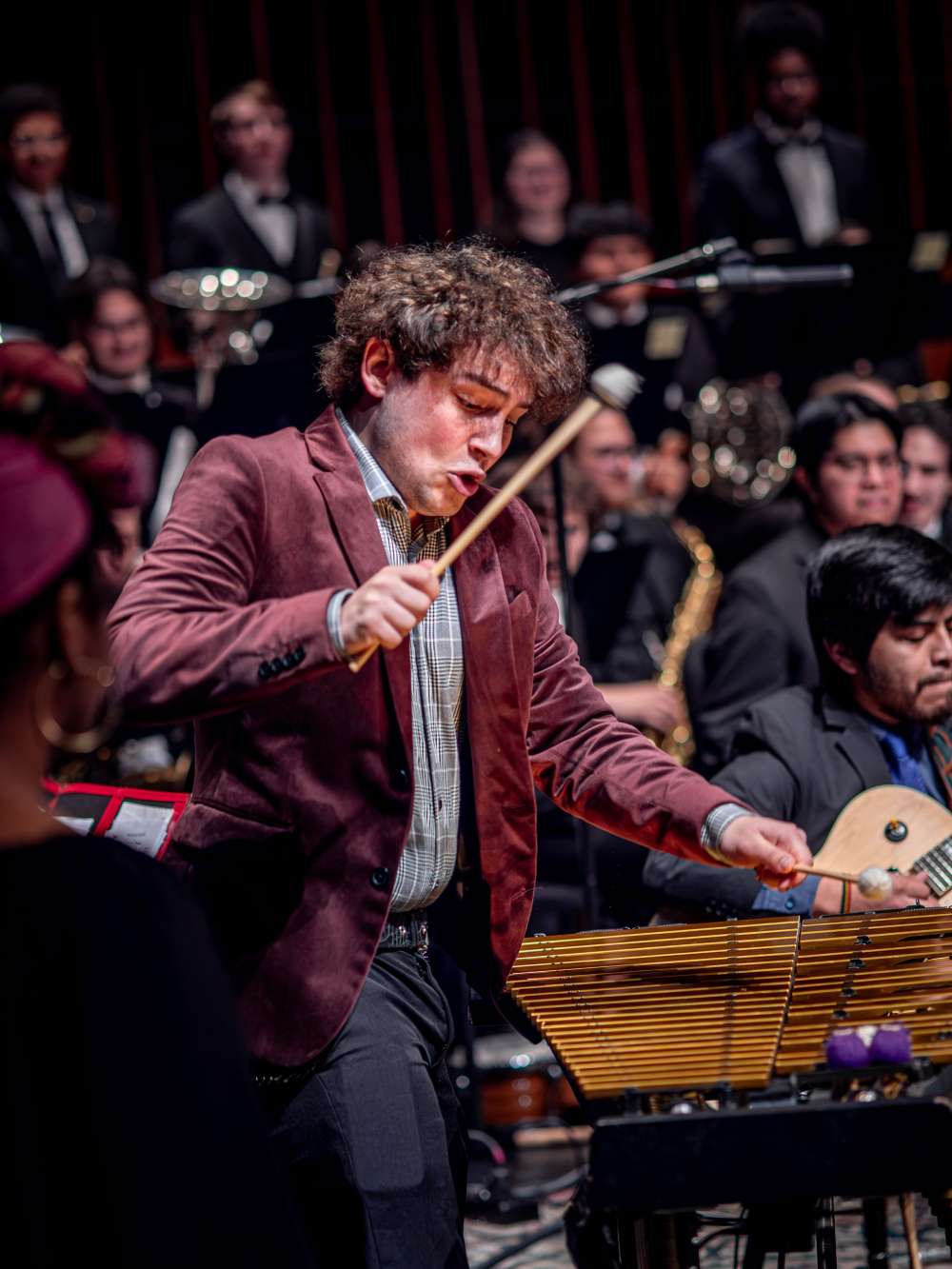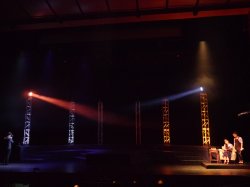Documentary Spotlights Promising Cali School of Music Vibraphonist
Bond between jazz student and professor unfolds against a backdrop of challenges
Posted in: Cali News

Documentary filmmakers set out to tell the story of a world-famous jazz vibraphone player, but they began to change the narrative after reviewing footage they shot at Montclair State University, where the vibraphonist, Steve Nelson, had recently started a gig as an adjunct professor in Jazz Studies at the John J. Cali School of Music.
“Something in the room was happening,” recalls Nathan Siegelaub, a writer and documentary filmmaker based in New York. “There was electricity. There was excitement. There was good camaraderie between the students.”
One Montclair student in particular stood out, a young vibraphonist, Pierce Sparnroft, who prefers to be identified with they/them pronouns and the name “Sparni.” “They’re incredibly talented and there’s something about them, how expressive they are,” Siegelaub recalled his professor at Columbia University, Graduate School of Journalism, where the film was produced, telling him. “There’s something there that you should dig a little deeper to find.”
While the filmmakers continued their work on Nelson’s influence on jazz, they also followed Sparni, now a senior Jazz Studies major, throughout the spring 2023 semester as the student prepared for a recital. “Once we learned more about Sparni, we discovered a story that needed to be told right now,” Siegelaub says.
The result is the documentary titled Sparni , directed by Siegelaub and Ania Gruszczyńska. It was shown at DocFest ’23, a showcase of work from Columbia’s Graduate School of Journalism. Among the audience, Sparni watched the film for the first time. “I was like, ‘Wow, here’s a culmination of a bunch of work that I’ve put in this year.’ It was gratifying to see it in front of me.”
Sparni is the story of a promising young musician, and also of the healing powers of music and the repercussions of mental illness. Sparni is open about their serious mental health struggles, something the filmmakers were sensitive to in telling Sparni’s story.
“Sparni by nature is expressive and open and has a need to express themselves and to share,” says Gruszczyńska, a journalist and documentary filmmaker living in London. “We were transparent and clear about our intentions. We were genuinely intrigued, and I think it showed Sparni that we were curious, we were empathetic.”
“I’m lucky in the sense that we, as a society and a culture, are a lot more accepting of openness towards mental health problems,” Sparni adds. “People were like, ‘Hey, we respect your honesty and this is stuff that a lot of people go through. Hearing another person talk about it, makes us feel more seen.’”
Since the documentary was made, Sparni’s second album, Sparni Plath’s Lament, was released – on their 22nd birthday – on January 29, the music, a mix of hip hop, rap, spoken word and poetry, taken from journals written during a period marked by mental health challenges.
“I don’t make a habit of oversharing, but I also feel, in my music, I talk about some dark stuff. At this point I’m desensitized to having that kind of information out about me. If it’s for an artistic reason, it doesn’t really faze me,” Sparni says.
The album comes with a warning. “I don’t want people to listen to my music and feel triggered or upset. But I’m also not going to water down what I have to say. I look at modern music right now and there’s all this emphasis on talking about your mental health, but nobody actually talks about what’s going on,” Sparni says. “People reference that their mental health is bad and people talk about coping, but nobody talks about what the actual symptoms of what you’re feeling is. Nobody talks about how to grow after going through a really rough place.”
To share those feelings, sections of the album feature voice recordings playing at the same time, stylistic choices that coincidentally mirror the editing techniques used in the documentary to express manic episodes and sensory overload.

It was the efforts of Jazz Studies Coordinator Oscar Perez, who ultimately brought Sparni and the filmmakers together when he matched his promising student with Nelson at a time when the young vibraphonist was thinking about changing instruments.
“Steve Nelson is one of the premier vibraphonists of his generation,” Perez says. “They have formed a special bond over their shared love of the music and the instrument with which they express themselves. It’s an honor to have him teaching our students.”
Sparni is grateful for the opportunity. “I’m studying with somebody who is a piece of the progression of my instrument and also a mover and shaker in the evolution of the music. And then on top of that, he’s a phenomenal teacher,” Sparni says.
Sparni grew up on Staten Island, New York, and says they chose Montclair for its affordability and high caliber of the Cali School program. As they prepare to graduate, Sparni plans to keep gigging. Over the past year, Sparni had debut performances on jazz radio station WBGO and NYC jazz clubs, including Dizzy’s Club and SOB’s (also known as Sounds of Brazil), and joined Dick Griffin’s jazz big band. Long term, Sparni plans a career as a jazz educator.
“There was something really organic that I found amongst the Cali students,” says the filmmaker Siegelaub. “There’s a real collaborative spirit that music certainly can and should bring, but which doesn’t always show. But at the Cali School, and especially in the Jazz Studies department, all of the students were generous toward one another, and worked hard late into the day. There was just something that you would feel in the hallways that said something here is going right.”
Story by Staff Writer Marilyn Joyce Lehren. Photos by John J. LaRosa
